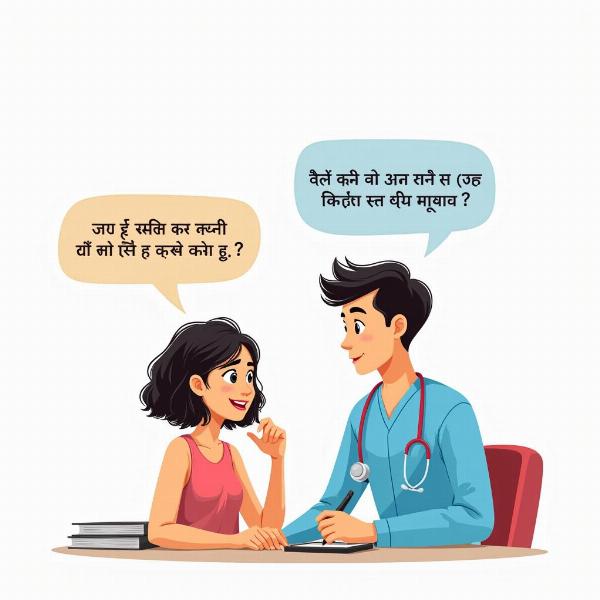Understanding how to express illness in Hindi is crucial for anyone navigating daily life in India. “I am sick” is a common phrase, and knowing its various Hindi translations can greatly enhance your communication. This article explores the nuances of expressing sickness in Hindi, covering everything from simple translations to more specific vocabulary related to different types of illnesses. Learning these phrases will not only improve your language skills but also allow you to better connect with people and seek help when needed.
Different Ways to Say “I Am Sick” in Hindi
Hindi offers a variety of ways to convey the feeling of being unwell. The most common and straightforward translation of “I am sick” is “Mai bimar hu” (मैं बीमार हूँ). This phrase is universally understood and suitable for most situations. However, depending on the severity and type of illness, more specific expressions can be used.
- “Mujhe tabiyat kharab hai” (मुझे तबियत खराब है): This translates to “I am not feeling well” and is a more general way of expressing discomfort. It’s suitable for mild illnesses or when you’re not sure about the specific ailment.
- “Main theek nahin hun” (मैं ठीक नहीं हूँ): Meaning “I am not fine,” this phrase can also indicate sickness, especially when accompanied by other symptoms.
- “Mera jee kharab hai” (मेरा जी खराब है): This expression implies nausea or an upset stomach.
Expressing Specific Ailments in Hindi
While “mai bimar hu” works in general situations, using more precise vocabulary can be beneficial. Here are some examples:
- Headache: “Mujhe sar dard hai” (मुझे सिर दर्द है)
- Fever: “Mujhe bukhar hai” (मुझे बुखार है)
- Cold: “Mujhe zukam hai” (मुझे जुकाम है)
- Cough: “Mujhe khansi hai” (मुझे खांसी है)
Learning these specific terms will allow you to communicate your symptoms more effectively, especially when seeking medical advice.
 Expressing Illness in Hindi
Expressing Illness in Hindi
Cultural Context of Illness in India
Understanding the cultural context surrounding illness in India can be helpful. Traditional remedies and home cures are often the first line of defense against common ailments. Family support is highly valued, and it’s common for family members to take care of sick relatives. Knowing these cultural norms can enhance your understanding and interactions with people in India.
When to Seek Medical Help
While home remedies can be effective for minor illnesses, it’s important to know when to seek professional medical help. If your symptoms persist or worsen, consulting a doctor is crucial. Knowing how to express “i am sick meaning in hindi” is the first step in getting the necessary medical attention.
Beyond “I am Sick”: Expressing Concern for Others
Learning how to express concern for others who are ill is equally important. Here are some useful phrases:
- “Aap kaise hain?” (आप कैसे हैं?): How are you?
- “Kya hua?” (क्या हुआ?): What happened?
- “Aapko kya ho raha hai?” (आपको क्या हो रहा है?): What’s wrong with you?
- “Jaldi theek ho jao” (जल्दी ठीक हो जाओ): Get well soon.
How to Describe Symptoms Effectively
When you are sick, it is important to be able to describe your symptoms accurately to a healthcare professional. This can help them diagnose your illness and provide the appropriate treatment. Learn some key vocabulary related to symptoms:
- Pain (Dard – दर्द): You can specify the location of the pain, for example, “pet mein dard” (stomach pain).
- Weakness (Kamzori – कमजोरी): This term can describe a general lack of energy.
- Dizziness (Chakkar aana – चक्कर आना): This phrase describes the sensation of lightheadedness.
Conclusion: Communicating Effectively About Illness in Hindi
Knowing how to say “i am sick meaning in hindi” and related expressions is essential for effective communication in India. From simple translations to more specific vocabulary, understanding the nuances of expressing illness can significantly improve your interactions and ability to seek help when needed. This knowledge not only enhances your language skills but also allows you to connect with people on a deeper level and navigate daily life in India with greater ease.
FAQ
- What is the most common way to say “I am sick” in Hindi? The most common way is “Mai bimar hu” (मैं बीमार हूँ).
- How do I say “I have a headache” in Hindi? You can say “Mujhe sar dard hai” (मुझे सिर दर्द है).
- What are some other ways to express feeling unwell in Hindi? You can say “Mujhe tabiyat kharab hai” (मुझे तबियत खराब है) or “Main theek nahin hun” (मैं ठीक नहीं हूँ).
- Is it common to use home remedies in India? Yes, home remedies are often the first line of defense against common ailments in India.
- How can I express concern for someone who is sick in Hindi? You can ask “Aap kaise hain?” (आप कैसे हैं?) or “Kya hua?” (क्या हुआ?).
Meaning-Hindi.in is your trusted partner for accurate and culturally sensitive Hindi translations. We offer a wide range of professional translation services, including business and commercial document translation, certified and legal document translation, technical and user manual translation, website and localization translation, educational and academic document translation, express translation, and specialized translations. Need help bridging the language gap? Contact us today at [email protected] or call us at +91 11-4502-7584. Meaning-Hindi.in is committed to delivering high-quality translations that meet your specific needs.